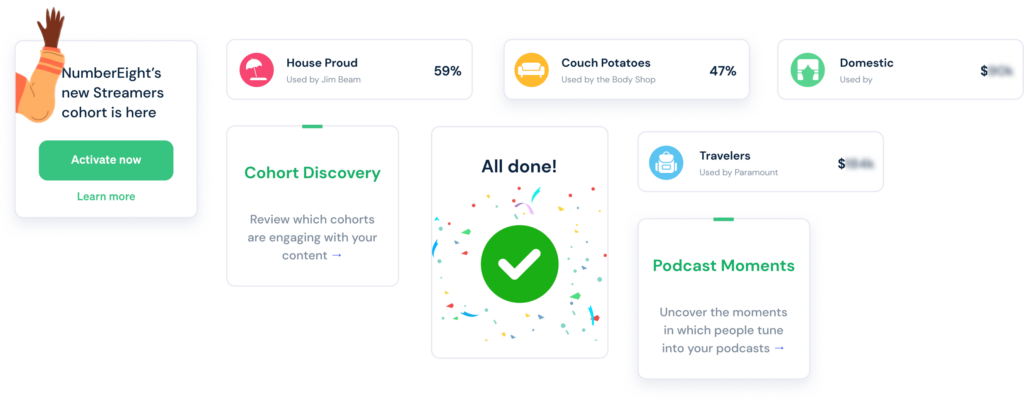The increase in CPM was largely due to their ability to better address advertiser briefs that require reaching hard-to-identify personas, such as Couch Potatoes for the Body Shop and people who are House Proud for Jim Beam.
The Solution: Cohort-based targeting
LiSTNR was able to reach these unique personas using our behavioral AI, which enables cohort-based targeting. Essentially, the technology converts raw sensor data from a listener’s mobile device into live moments, such as Working or Jogging, and behavior-based cohorts like Travellers or Long-Hour Workers. By infusing their inventory with these live moments and cohorts, LiSTNR enabled their advertisers to deliver relevant ads that capture listeners’ attention.
How does this work exactly?
Cohort-based targeting consists of tree core features.
1. Unbiased behavioral data
Let me illustrate the meaningful difference between behavioral and self-reported data by means of a personal example.
I’ve been an avid jogger for years. Following a knee injury I had to give up my favourite pastime and decided to join a friend in going to the gym instead. While my behavior suggests I’m now a Gym Goer, in conversation I still refer to myself as a Jogger – because it’s still part of my identity.
Discrepancies between our self image and who we actually are are more common that most of us would like to admit: we hold on to past identities that we’re not quite ready to let go of, ‘try on’ aspirational identities that aren’t yet our own, and tweak the way we present ourselves to the world to conform with or rebel against social expectations (I see you, Couch Potatoe). It’s human nature, and it is completely fine.
However, advertisers targeting against self identities will fail to reach their prospects because our purchase decisions are based on our actual needs. After all, since I started going to the gym I’ve bought gym outfits – not running gear.
What does this mean for advertising tech?
Our behavioral AI derives live moments and cohorts from real and current user behavior, as detected by sensors on users’ phones. Since this data originates from users’ behavior, it eliminates self-reporting bias.
By infusing their inventory with over 85+ live, behavior-based cohorts, LiSTNR was able to match virtually any persona at scale. No longer constrained by third-party data and user feedback, they were now able to map and target their entire user base.

2. Live targeting
While targeting based on behavioral relevancy set a new bar in digital media, our product team didn’t stop there. They saw an additional opportunity to create razor-sharp ad experiences by leveraging timing. After all, user needs vary based on current activities, weather conditions, time of day, and so on.
Live targeting optimizes for what people waIn staying with my previous example: as a Gym Goer, I often drink sports drinks to help restore my body’s electrolytes and antioxidants. However, I’m not interested in sports drink ads while deeply engrossed in my favourite Netflix series, recovering from a hangover – I’m much more receptive to those ads when I return home from my lunchtime workout.nt right now – cutting through the ad noise and delivering impact with every impression.
Live targeting optimizes for what people want right now – cutting through the ad noise and delivering impact with every impression.
3. Edge AI
Besides using behavior-based and live data, cohort-based targeting has a characteristic that is perhaps its most defining: it sits on the Edge. This means that not only does our AI compute the data on the user’s device, but it also processes the data there, eliminating the need for IDs and thus making it a privacy-by-design solution.
Beyond launching it as a solution to the increasingly stringent privacy landscape, this means that cohort-based targeting reinstates addressability. In the case of LiSTNR: 92% of their audience had at least one cohort or live moment assigned, enabling them to monetize 92% of their inventory.

The results: real cohorts, real impact
In the space of 9 months our collaboration delivered significant results, from increased addressability to new premium campaigns. Here’s the summary.
1. 15% CPM Lift
Data layering is a key tactic to increase the value of impressions. By activating in-moment and behavior-based targeting, advertisers valued LiSTNR’s inventory more.
2. 92% of impressions had a cohort or live moment assigned
This significantly increased LiSTNR’s addressable impressions, making sure that every impression is valuable to advertisers.
3. 86% of active users had cohorts assigned
LiSTNR leveraged NumberEight’s Edge AI to access more of its audience data, allowing their sales team to activate campaigns at scale – even for less common personas.
4. New campaign budgets won
LiSTNR attracted new advertising campaign budgets for brands such as Bob Jane and Swisse, which were intrigued by the ability to target against behavioral and live data.
”The ability to offer hyper-targeted campaigns without the need for PII or identifiers is ground-breaking.”
– Kim Loasby, Digital Ad Product & Strategy Director, SCA/LiSTNR
Curious?
Are you curious to find out what cohort-based targeting can do for your audio, gaming, or other entertainment company? Or are you an agency or advertiser looking to understand which cohorts and live moments are available? Book a call with us or download the taxonomy.










